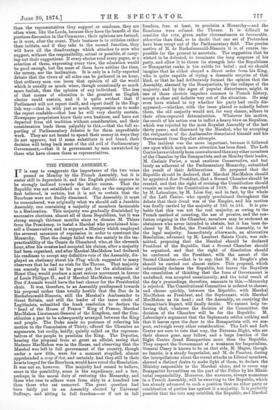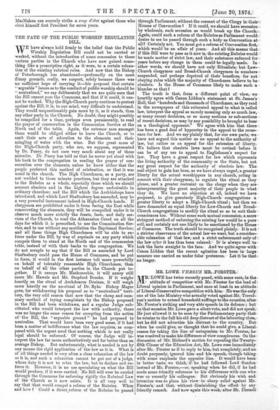THE FRENCH ASSEMBLY.
IT is easy to exaggerate the importance of the two votes passed on Monday by the French Assembly, but it is easier still to depreciate it, and the English public appears to be strongly inclined towards the latter course. That the Republic was not established on that day, as the sanguine at first believed, is certain, but it is not so certain that the Bourbons were not finally dismissed. The Assembly, it must be remembered, was originally what we should call a Jacobite Assembly, one containing a majority of members favourable to a Restoration. This majority was gradually diminished by successive elections, almost all of them Republican, but it was strong enough thirteen months since to dismiss M. Thiers from the Presidency, to instal a Marshal who proclaimed him- self a Conservative, and to support a Ministry which employed the severest measures of repression in order to construct the Monarchy. That the design failed was due mainly to the im- practicability of the Comte de Chambord, who, at the eleventh hour, after his cousins had accepted his claims, after a majority had been organised, and after Marshal MacMahon had declared his readiness to accept any definitive vote of the Assembly, dis- played an obstinacy about his Flag which suggested to many observers that he had no wish for the Throne. That majority can scarcely be said to be gone yet, for the abdication of Henri Cinq would produce a most serious movement in favour of Louis Philippe H., and if Marshal MacMahon resigned, the Due d'Aumale would have the best chance for the Presidential chair. It was, therefore, to an Assembly predisposed towards his proposal rather than totally hostile that the Duc de la Rochefoucauld-Bisaccia, still the Marshal's Ambassador to Great Britain, and still the leader of the inner circle of Legitimists, submitted the frank resolution to declare the "head of the House of France" King of France, Marshal MacMahon Lieutenant-General of the Kingdom, and the Con- stitution a pact to be subsequently arranged between the King and people. The Duke made no pretence of referring his motion to the Commission of Thirty, offered the Chamber no arguments, but coolly, boldly, quietly called on the represen- tatives of the people to proclaim the King. The Deputies, hearing the proposal from so great an official, seeing that Madame MacMahon was in the House, and observing that the Marshal was left in full government of the country, though under a new title, were for a moment stupified, almost apprehended a coup d'e'tat, and certainly, had they still in their
hearts longed for the Bourbons, would have voted the Resolution. It was not so, however. The majority had ceased to believe, some in the possibility, some in the expediency, and a few, perhaps, in the moral duty of restoring the Monarchy, and those who rose to adhere were from sixty to a hundred less than those who sat unmoved. The great question had been fairly put to an Assembly elected by Universal Suffrage, and sitting in full freedom—or if not in full freedom, free, at least, to proclaim a Monarchy—and the Bourbons were refused the Throne. It is difficult to consider the vote, given under circumstances so favourable, other wise than final, or to doubt that one set of Pretenders have been swept out of the Parliamentary field. The precise motive of M. de Rochefoucauld-Bisaccia it is, of course, im- possible for the present to ascertain. The suggestion that he wished to be defeated, to terminate the long suspense of his party, and allow it to throw its strength into the Republican or Bonapartist ranks, is too subtle for belief ; and we should imagine that he eithei obeyed a direct order from his King, who is quite capable of trying a dramatic surprise of that kind, or that he had deliberately formed the opinion that the Assembly, alarmed by the Bonapartists, by the collapse of the majority, and by the signs of popular disturbance, might, in one of those electric impulses common in French history, accept a clear and definite way out of the situation. He may even have wished to try whether his party had really dis- appeared,—whether, with the issue placed so nakedly before them, the old majority would not, for very shame, adhere to their often-repeated determination. Whatever his motive, the result of his action was to inflict a heavy blow on Royalism, which was rejected by the most Royalist Assembly of the last thirty years ; and disowned by the Marshal, who by accepting the resignation of the Ambassador dissociated himself and his Government from Royalist attempts.
The incident was the more important, because it followed one upon which much more attention has been fixed. The Left Centre have evidently been more alarmed than any other members of the Chamber by the Bonapartists, and on Monday their leader, M. Casimir Perier, a most cautious Conservative, and but lately an adherent of the Parliamentary Monarchy, submitted the result of their deliberations. He proposed that the Republic should be declared, that Marshal MacMahon should be appointed first President, that a Second Chamber should be created, and that the right of revising the Constitution should remain as under the Constitution of 1848. He was supported by M. Laboulaye, by M. Lion Say, and in fact, by the whole of the Left Centre, who openly proclaimed throughout the debate that their dread was of the Empire, and his motion was finally carried by the majority of 345 to 341. It is pro- bable that this was not the real majority, as owing to the French method of counting, the use of proxies, and the con- fusion reigning in the Chamber, members may be reckoned as abstainers who never intended to abstain, but it has been de- clared by M. Buffet, the President of the Assembly, to be the legal majority. Immediately afterwards, an alternative Resolution, advanced by M. Lambert Sainte Croix, was sub- mitted, proposing that the Marshal should be declared President of the Republic, that a Second Chamber should be organised, and that the right of dissolution should be conferred on the President, with the assent of the Second Chamber,—that is to say, that M. de Broglie's plan should be carried out almost entire. This proposal, which inferentially declares the Republic, but leaves the Royalists the consolation of thinking that the form of Government is undefined, was accepted unanimously, and the total result of the day's proceedings, therefore, amounts to this,—Monarchy is rejected. The Constitutional Committee is ordered to choose, and choose quickly, between the Republic, with Marshal MacMahon as President, and the Septennate, with Marshal MacMahon as its head ; and the Assembly, on receiving the Committee's Report, will finally decide. We cannot help be- lieving that, whatever the decision of the Committee, the decision of the Chamber will be for the Republic. M. Laboulaye's argument that the Septennate settles nothing and that it leaves open the door to the Bonapartists will, we sus- pect, outweigh every other consideration. The Left and Left Centre are sure to vote that way, the Extreme Right, who see their chance gone, may follow, and a large fraction of the Right Centre dread Bonapartism more than the Republic. They suspect the Government of a weakness for Imperialism, General Cissey is known to be on that side, M. Magne, though no fanatic, is a steady Imperialist, and M. de Fourtou, during the interpellations about the recent attacks on Liberal members, showed a distinct desire to make light of them, to declare the Ministry responsible to the Marshal alone, and to cover any Bonapartist favouritism on the part of the Police by his Minis- terial responsibility. Moreover, the waverers, always numerous in a French Assembly, will be swerving to the Republic, which has already advanced to such a position that no other party or combination of parties has against it a majority. It is perfectly possible that the vote may establish the Republic, and Marshal
McMahon can scarcely strike a coup de'tat against those elect himself first President for seven years.



































 Previous page
Previous page